Gợi ý 30 bài mẫu trả lời chủ đề IELTS Speaking Food
IELTS Speaking about Food có thể xem như là nỗi ám ảnh của khá nhiều thì sinh do chưa có sự chuẩn bị kỹ càng về từ vựng, cấu trúc, cũng như là ý tưởng để trả lời. Thông qua bài viết này, DOL sẽ giúp các bạn củng cố lại các từ vựng thuộc chủ đề này, hướng dẫn các bạn cách trả lời để biến chủ đề IELTS Speaking Food trở nên dễ dàng hơn bao giờ hết.
DOL IELTS Đình Lực
Nov 08, 2022
2 mins read

Table of content
1. Từ vựng IELTS Speaking Food
1.1 Món khai vị
1.2 Món ăn chính
1.3 Món tráng miệng
1.4 Collocations và Idioms
2. Mẫu câu trả lời IELTS Speaking Food and Cooking
2.1 What is your favorite food?
2.2 Is there any food you dislike?
2.3 What are some traditional foods in your country?
2.4 Have you always liked the same food?
2.5 What is a common meal in your country?
2.6 What do you think of fast food?
2.7 Do you have a healthy diet?
2.8 What's the difference between picnics and cooking at home?
2.9 Who does the cooking in your family? Why?
2.10 Did you learn how to cook when you were younger?
2.11 Do you think Vietnamese people's diet is healthy?
2.12 Do you like tasting new food?
2.13 Have you ever tried foreign food?
2.14 What kinds of new foods have you tried recently?
2.15 What kinds of things do you eat for dinner in your country?
2.16 Do you like food from other countries near Vietnam?
2.17 Do you like to cook?
2.18 Do you think cooking is a pleasure or a chore for people who have busy lives?
2.19 What time do you usually eat dinner?
2.20 Will you change your diet habits?
2.21 What do you enjoy the most about a meal?
2.22 What foods from your country do most foreign people enjoy?
2.23 What kinds of meals do you like?
2.24 Do you often eat dinner with your family or friend?
2.25 Are there any fruits or vegetables you don’t like?
2.26 Do you like chocolate as a child?
2.27 Do you think most people like chocolate? Why?
2.28 What kinds of food are most popular in your country?
2.29 What kinds of foreign food are popular in your country?
2.30 What are the differences between the way young and old people think about new food?
Câu hỏi thường gặp
1. Từ vựng IELTS Speaking Food
Trước hết, hãy cùng DOL điểm qua một số từ vựng, và cụm quan trọng cần thiết để sử dụng cho phần thi Speaking about Food nhé:
1.1 Món khai vị
Starter (n): món khai vị
Salad (n): xà lách
Soup (n): súp
Bread (n): bánh mì
Cheese (n): phô mai
Butter (n): bơ
Biscuit (n): bánh quy
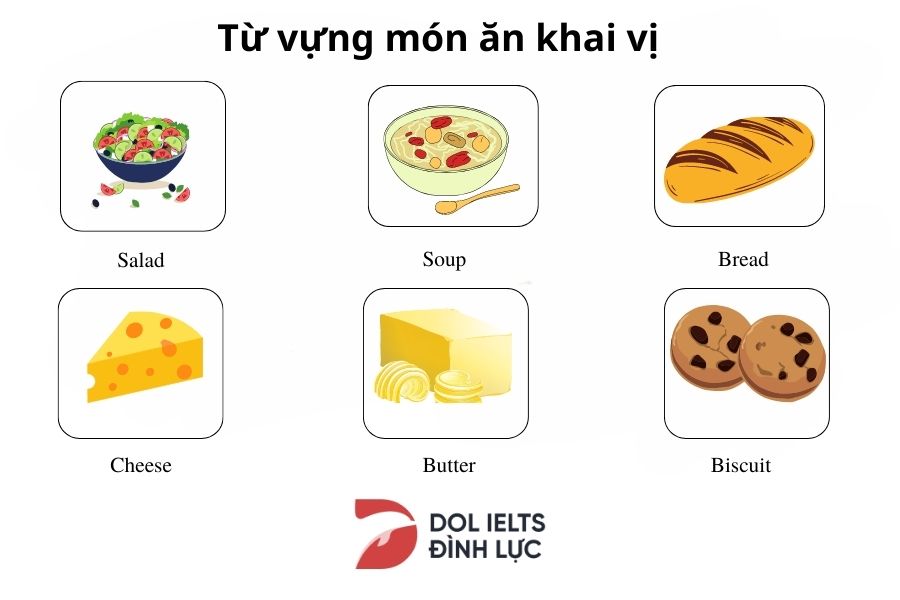
1.2 Món ăn chính
Main course (n): món chính
Rice (n): cơm
Noodle (n): mì
Spaghetti (n): mì Ý
Chicken (n): thịt gà
Duck (n): thịt vịt
Pork (n): thịt heo
Beef (n): thịt bò
Lamb (n): thịt cừu
Turkey (n): gà tây
Bacon (n): thịt muối xông khói
Egg (n): trứng
Sausage (n): xúc xích
Seafood (n): hải sản
Shrimp (n): tôm
Crab (n): cua
Lobster (n): tôm hùm
Mussel (n): vẹm
Scallop (n): sò điệp
Oyster (n): hàu
Salmon (n): cá hồi
Tuna (n): cá ngừ
Catfish (n): cá da trơn
Sole (n): cá bơn
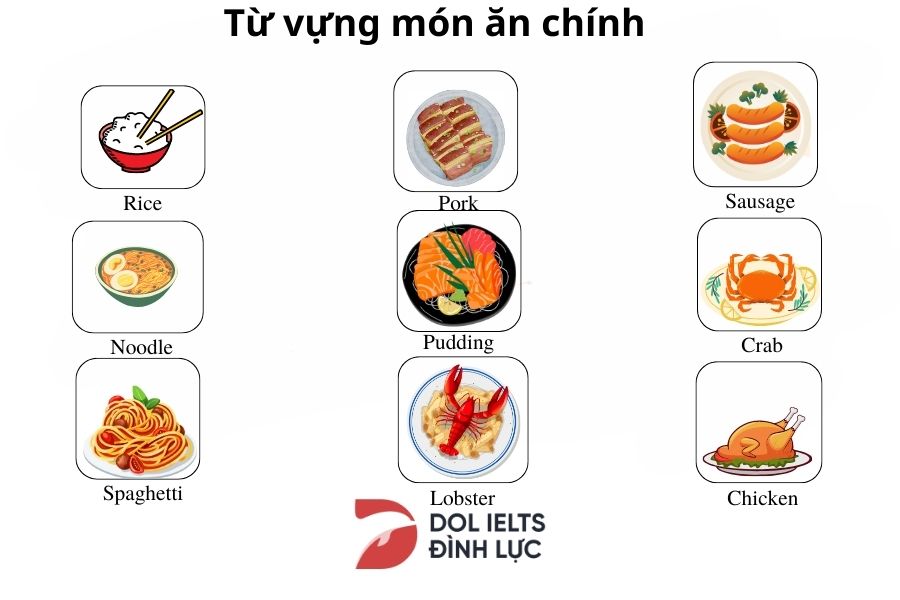
1.3 Món tráng miệng
Dessert (n): món tráng miệng
Ice-cream (n): kem
Yogurt (n): sữa chua
Jelly (n): rau câu, thạch
Fruit (n): trái cây
Cheese cake (n): bánh kem phô mai
Brownie (n): bánh sôcôla hạnh nhân
Pudding (n): bánh pudding
Cookie (n): bánh quy dẹt
Juice (n): nước ép
Smoothie (n): sinh tố
Bubble tea (n): trà sữa trân châu
Milkshake (n): sữa lắc
Soft drink (n): nước uống có ga
Cocktail (n): nước uống trái cây có cồn
Mocktail (n): nước uống hỗn hợp trái cây không chứa cồn
Herbal tea (n): trà thảo mộc
Black coffee (n): cà phê đen
White coffee (n): cà phê sữa
Instant coffee (n): cà phê hoà tan
Filter coffee (n): cà phê phin
Espresso (n): cà phê đậm đặc
Latte (n): cà phê pha với sữa nóng và có váng bọt sữa
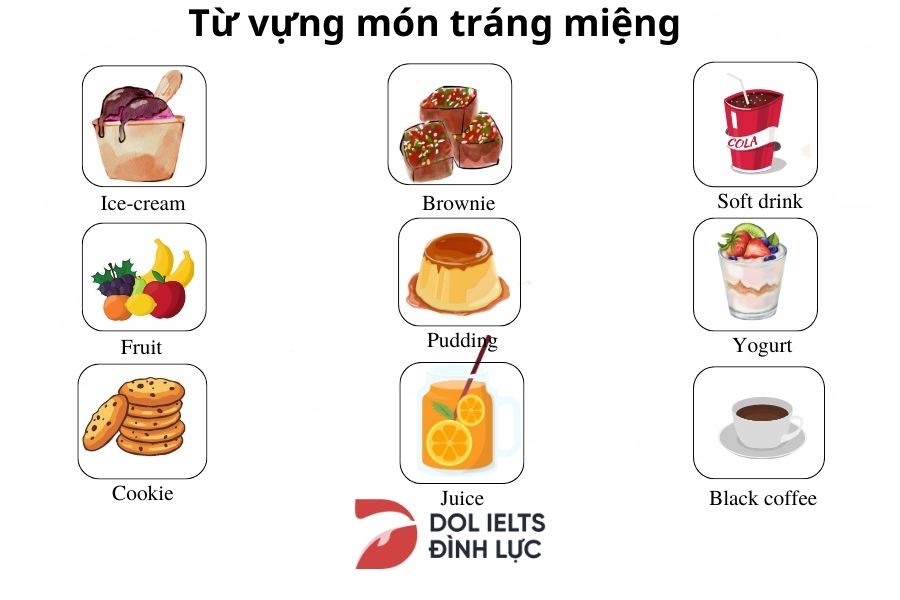
1.4 Collocations và Idioms
To raise our glass: nâng ly chúc mừng
To have a sweeth tooth: hảo ngọt
To eat like a horse: ăn rất nhiều
To grab a bite to eat: ăn nhanh, ăn vội vàng
To eat out: ăn ở bên ngoài
My cup of tea: gu, sở thích
To be mouth-watering: trông rất ngon, tạo cảm giác thèm ăn
Processed food: đồ ăn chế biến sẵn
Home-cooked food: đồ ăn nhà làm
Organic food: đồ ăn/thực phẩm hữu cơ
Gourmet food: thực phẩm hảo hạng
Leftover food: đồ ăn thừa, còn dư
Food poisoning: ngộ độc thực phẩm
Food hygiene: vấn đề vệ sinh thực phẩm
Food additive: gia vị đồ ăn
A slap up meal: một bữa ăn lớn
To wine and dine: chiêu đãi ai đó bằng 1 bữa ăn thịnh soạn
To follow a recipe: làm theo công thức nấu ăn
Food safety: an toàn thực phẩm
Food consumption: sự tiêu thụ thực phẩm
Traditional cuisine: ẩm thực truyền thống
Authentic local speciality: đặc sản vùng miền
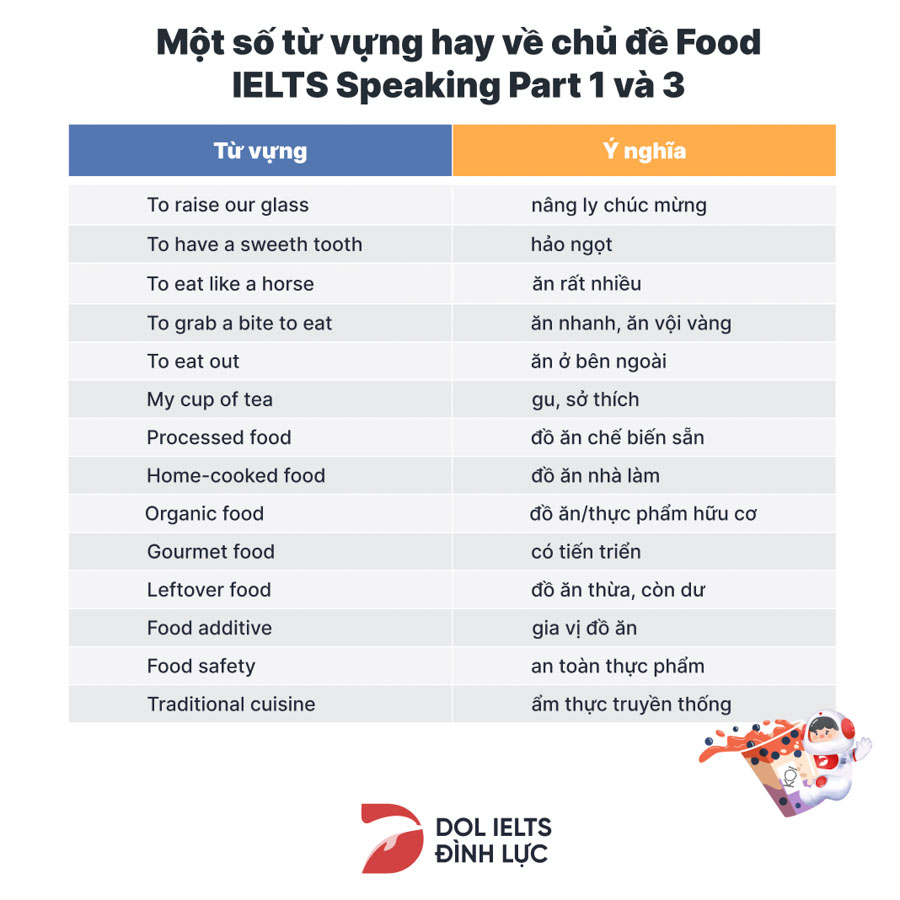
2. Mẫu câu trả lời IELTS Speaking Food and Cooking
Sau khi đã trang bị được kha khá một vốn từ vựng nhất định rồi. Hãy cùng DOL giải quyết hàng loạt câu hỏi liên quan đến chủ đề về Food đặc biệt là trong 2 phần Speaking part 1 và part 3 nào!
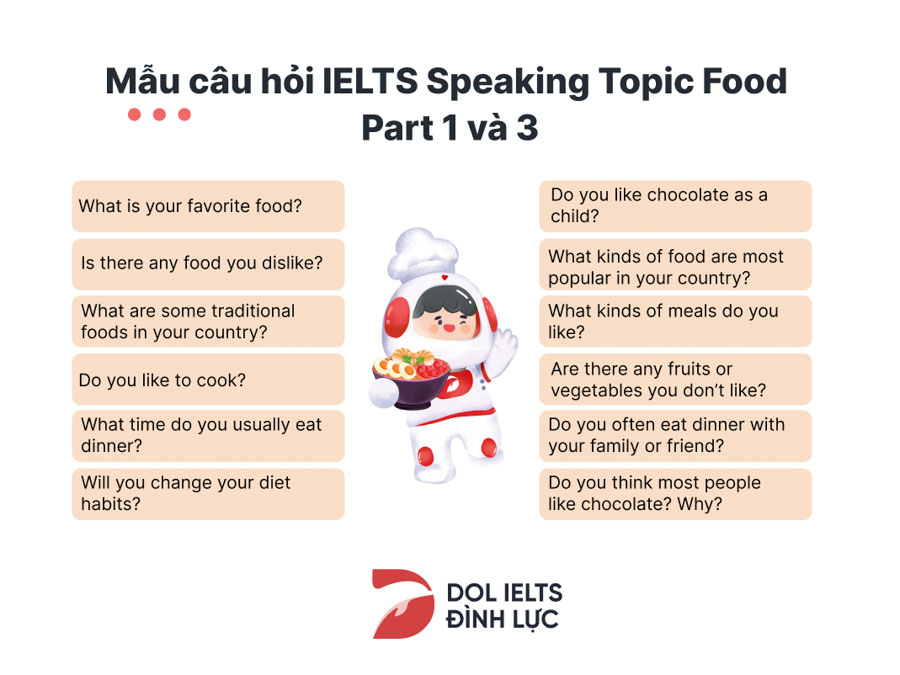
2.1 What is your favorite food?
Well, I would say since I have a sweet tooth, I am a huge fan of desserts. But if I had to choose one, it would be cheesecakes. I usually follow a recipe I learned from the Internet. It has quite a few ingredients, but the process is not complicated. On special occasions, I usually make cheesecakes to serve my family after dinner.
Vocabulary:
have a sweet tooth: hảo ngọt
recipe: công thức nấu ăn
ingredients: thành phần
special occasions: dịp đặc biệt
2.2 Is there any food you dislike?
I’m not a picky person, so I don’t have any problems with food. However, raw fish such as salmon or tuna sashimi is not my cup of tea. I can’t stand anything stinky or fishy. I would prefer them to be well-cooked in a hot pot or something like that.
Vocabulary:
Picky: khó tính
Raw: đồ sống
My cup of tea: sở thích
Fishy: tanh
2.3 What are some traditional foods in your country?
Well, Vietnam has a very rich cultural diversity, which means that there are various types of traditional food. To name some, there are Chung cake, spicy beef noodle soup, or sticky rice. Actually, every region has its own local speciality, but I do believe that Pho is still the most popular one among other dishes. It’s very well-seasoned and can be served for any mealtime during the day.
Vocabulary:
Cultural diversity: sự đa dạng văn hoá
Local speciality đặc sản địa phương
Well-seasoned: được nêm đậm vị
Mealtime: giờ ăn
Xem thêm: Tham khảo về chủ đề music IELTS Speaking
2.4 Have you always liked the same food?
Not really. I mean, the food I liked as a child and the food I like now are totally different. I believe it's a normal thing though, just as a result of growing up.
Vocabulary:
totally different: hoàn toàn khác nhau
normal thing: điều bình thường
result of growing up: kết quả của việc lớn lên
2.5 What is a common meal in your country?
Well. I’m an Asian so it’s rice for sure! We have it almost every single day, in every single meal. It's simply because rice is easy to grow in Vietnam; it provides lots of energy and it is cheap as well so everyone can afford it.
Vocabulary:
for sure: chắc chắn
have it: ăn món đó
provides lots of energy: cung cấp nhiều năng lượng
afford: có khả năng chi trả
2.6 What do you think of fast food?
I think fast food is convenient, for sure, but it's extremely unhealthy. I mean, it's okay to have fast food like once or twice a week but having it everyday can seriously damage your health! One of my friends, Daisy, ate fast food for months straight and she's obese now.
Vocabulary:
Convenient: tiện
Unhealthy: không lành mạnh
damage your health: gây hại cho sức khỏe của bạn
obese: béo phì
2.7 Do you have a healthy diet?
I think so. I used to eat very unhealthily, mostly only consuming fast food and no vegetables. However, I'm learning to eat more healthily now and try to have as diverse a diet as possible!
Vocabulary:
Unhealthily: một cách không lành mạnh
Fast food: thức ăn nhanh
Vegetables: rau củ
As diverse a diet as possible: chế độ ăn uống đa dạng nhất có thể
2.8 What's the difference between picnics and cooking at home?
Well, the most obvious difference is that cooking at home is more comfortable because you have all the ingredients and tools that you need! In contrast, it’s tough to cook in nature during picnics and you either have to be really well-prepared, or you have to learn to make do with what you have.
Vocabulary:
Comfortable: thoải mái
ingredients and tools: nguyên liệu và công cụ
In contrast: trái lại
Tough: khó khăn
well-prepared: được chuẩn bị kỹ
Xem thêm: Tìm hiểu về chủ đề music IELTS Speaking part 3
2.9 Who does the cooking in your family? Why?
Definitely my mom. She is in charge of all the cooking in my family since she is passionate about cooking. In fact, she always makes sure that we are served different types of dishes every meal, which is awesome. Nevertheless, my dad will do the grilling part of barbecue food if my family has a party.
Vocabulary:
in charge of: chịu trách nhiệm về
passionate about: đam mê điều gì
barbecue food: đồ ăn nướng
2.10 Did you learn how to cook when you were younger?
Fortunately, yes. When I was a little boy, I loved going to the kitchen to back up my grandmother with some side jobs. From that, I can pick up a few recipes and cooking methods. She also taught me how to decorate a finished dish with vegetables.
Vocabulary:
back up: hỗ trợ
side jobs: công việc phụ ngoài lề
recipe: công thức nấu ăn
cooking methods: phương pháp nấu ăn
decorate: trang trí
2.11 Do you think Vietnamese people's diet is healthy?
Yes, obviously. Vietnamese people always try to ensure their meals have enough necessary nutrients. That’s the reason it is almost a must to have vegetables and soup in every meal, and that’s quite healthy. We also use some natural spices and herbs, which are believed to have some medical benefits, to season the food.
Vocabulary:
Nutrient: chất dinh dưỡng
Spice: gia vị
Herbal: thảo mộc
Medical benefit: lợi ích về y học
Season: nêm nếm
2.12 Do you like tasting new food?
As a foodie, it’s a firm yes for me. I always dream of experiencing all different kinds of food. Every cuisine has its own special features, and it would be so great if we can try the local food. It’s not only about the taste, but also the underlying meaning behind such dishes.
Vocabulary:
Foodie: người thích đồ ăn
Experience: trải nghiệm
Special features: đặc điểm đặc biệt
Underlying meaning: ý nghĩa thực sự đằng sau
2.13 Have you ever tried foreign food?
Of course yes. I have a chance to taste lots of food, but my favorite one is Thai food. Even though it is spicy, most of the dishes are incredibly delicious, especially Tom Yum soup. It’s such a perfect combination of sour and sweet taste.
Vocabulary:
Spicy: cay
Delicious: ngon
Perfect combination: sự kết hợp hoàn hảo
Sour: chua
2.14 What kinds of new foods have you tried recently?
Recently, I’ve been on a diet. Therefore, I usually look for healthy diets such as vegetables or low-calorie food. I was introduced to some vegetarian diets. Initially, I found it hard to maintain this habit. Then, after a while, I am motivated by the fact that I’ve lost 3 kilometers by eating this on a regular basis.
Vocabulary:
On a diet: theo chế độ ăn, giảm cân
Low-calorie food: thực phẩm ít calo
Vegetarian diet: chế độ ăn chay
Maintain this habit: duy trì thói quen này
On a regular basis: thường xuyên
2.15 What kinds of things do you eat for dinner in your country?
The food that we eat for dinner can be quite diverse. However, for home-cooked meals, we mainly have rice. We have it with different Vietnamese dishes, among which I believe pork and fried fish are the most popular ones.
Vocabulary:
Diverse: đa dạng
Home-cooked meals: món ăn được làm tại nhà
Most popular: phổ biến nhất
2.16 Do you like food from other countries near Vietnam?
Certainly, I do. I have a special love for Chinese cuisine. Just like their culture, Chinese people offer a wide range of food. I’m interested in this food partly because its taste is pretty similar to Vietnamese food. We have some commons in the way we process and season the food.
Vocabulary:
Cuisine: ẩm thực
Have some commons in: có nhiều điểm giống nhau trong việc gì
Process and season: chế biến và nêm nếm
2.17 Do you like to cook?
I consider myself an excellent cook. But unfortunately, I’m not into cooking. This is because I have a pretty hectic schedule, which means that I don’t have enough time to prepare a high-quality meal. So, most of the time, I just choose to eat out and have takeaway food at home. Only on important events such as birthdays, I will roll my sleeves up and get hands-on with something.
Vocabulary:
Hectic schedule: thời gian biểu bận rộn
Prepare a high-quality meal: chuẩn bị một bữa ăn chất lượng
Eat out: ăn ở ngoài
Takeaway food: đồ ăn mang đi
Roll my sleeves up and get hands-on with something: bắt tay vào làm một việc gì đó
2.18 Do you think cooking is a pleasure or a chore for people who have busy lives?
It depends. For people who are extremely busy. Cooking could be a nightmare as it involves too much preparation and cleaning. In contrast, people who have plenty of time will think of cooking as a hobby. For them, cooking for their beloved ones is the definition of happiness.
Vocabulary:
Nightmare: cơn ác mộng
Preparation: sự chuẩn bị
Hobby: sở thích
Beloved ones: những người yêu thương
2.19 What time do you usually eat dinner?
Because my working time is quite flexible, I don’t have a certain time for dinner. I’m only able to say I often have it after 7 p.m. That is when I mostly finish my job and can have a little time to grab a bite to eat to fill my empty stomach.
Vocabulary:
Flexible: linh động
Grab a bite to eat: ăn vội
Empty stomach: bao tử rỗng
2.20 Will you change your diet habits?
To be honest I think I should. As I said, I regularly have fast food for lunch and dinner, which is not good for my state of health. I consider spending more time preparing home-cooked dishes. They can not only ensure healthy nutrition but also help to keep my body in shape.
Vocabulary:
Fast food: đồ ăn nhanh
State of health: thể trạng
Home-cooked: nấu ăn tại nhà
Keep my body in shape: giữ thân hình cân đối
2.21 What do you enjoy the most about a meal?
It would definitely be desserts. I have a sweet tooth, and I always expect a cup of ice cream at the end of the meal. Needless to mention that most desserts are beautifully decorated, which makes them much more mouth-watering.
Vocabulary:
Dessert: món tráng miệng
Have a sweet tooth: hảo ngọt
Beautifully decorated: được trang trí đẹp
Mouth-watering: ngon và hấp dẫn
2.22 What foods from your country do most foreign people enjoy?
I believe foreigners find Pho very fascinating. That’s a thing that still imprints in their mind after they pay a visit to Vietnam. I guess it is because Pho is well-seasoned with various kinds of spices. Also, the taste is neutral and friendly to most people.
Vocabulary:
Imprint in one’s mind: khắc sâu vào trong trí nhớ
Well-seasoned: nêm nếm đậm vị
Spice: gia vị
Neutral: trung tính
2.23 What kinds of meals do you like?
Personally, I prefer meals which contain enough essential nutrients. It should include meat, vegetables, and soup. This is why homemade meals are always the best. I can ensure my body is healthy as well as have quality time with my family.
Vocabulary:
Essential nutrient: chất dinh dưỡng thiết yếu
Homemade meal: các món ăn nhà làm
Quality time: thời gian chất lượng
2.24 Do you often eat dinner with your family or friend?
I try my best to have dinner with my family as much as possible. It’s always nice and fun to be surrounded by your beloved ones at dinner. However, I eat out with my friends sometimes. It is great to try on different kinds of food, I believe there are foods in restaurants that we have never seen at home.
Vocabulary:
Surrounded by: được vây quanh bởi
Eat out: ăn ở ngoài
Try on: thử
2.25 Are there any fruits or vegetables you don’t like?
Yes, there’re a few. Durian is the first thing that pops up in my mind. It has such a strong smell that makes me dizzy even just being nearby, let alone eating it. Although it is seen as a king of fruit, it’s always on my black list.
Vocabulary:
Pops up: xuất hiện
Dizzy: choáng váng
Let alone eating it: huống hồ là ăn nó
2.26 Do you like chocolate as a child?
Oh yes for sure. I love the taste of bittersweet. Also, the feeling when a bar of chocolate melts in our mouth is just amazing. Besides, chocolate is usually served with nuts, which makes it even better. Until now, chocolate is an indispensable part of my house on Christmas and New year.
Vocabulary:
Bittersweet: vừa ngọt vừa đắng
Melt: tan chảy
Nuts: các loại hạt
Indispensable: không thể thiếu được
2.27 Do you think most people like chocolate? Why?
I don’t think so. Some people can’t stand the sweet taste. Moreover, chocolate is not recommended for people who have health problems such as diabetes or obesity. Not to mention that there may be people who are allergic to some ingredients contained in chocolate.
Vocabulary:
Health problems: các vấn đề sức khỏe
Diabetes: bệnh tiểu đường
Obesity: bệnh béo phì
Be allergic to: dị ứng với
2.28 What kinds of food are most popular in your country?
In Vietnam, we mainly have rice for mealtime. It is a complement to other main courses, namely pork, chicken or beef. And since food is often considered a big matter in most families, we usually prepare a full-course meal with some sort of side dishes and soups as well.
Vocabulary:
Complement: phần bổ sung
main course: món chính
Full-course meal: bữa ăn đầy đủ
Side dishes: món phụ
Xem thêm: Tham khảo về chủ đề Talk about your best friend IELTS Speaking
2.29 What kinds of foreign food are popular in your country?
From my observation, I think it’s definitely Japanese cuisine. There are so many Japanese restaurants in HCM city, selling varieties of dishes too, not just sushi. This is just my guess, but I think the reason for this is that, even though we use different spices and cooking methods, the philosophy behind Vietnamese cuisine and Japanese food is very much similar: both aims for an elemental balance and harmony between the ingredients, and both really utilize the healing properties of herbs and vegetables into cooking. Not to mention that most young people are exposed to Japanese culture from a very young age, through anime and mangas, so I think that also attributes to why Vietnamese people enjoy Japanese food so much.
Vocabulary:
Observation: sự quan sát
Spices: gia vị
Cooking methods: phương pháp nấu ăn
Philosophy: triết lý
Elemental balance and harmony: sự cân bằng và hài hoà giữa các nguyên tốt
Healing properties: đặc tính chữa lành
Herbs: thảo mộc
2.30 What are the differences between the way young and old people think about new food?
I think one major difference is in how eager we are to try them. For instance, the first week when Starbucks first opened in HCM city, thousands of people lined up to try it, and there were mostly young people and not many old people there. I think this is because in the age of social media, young people always seem to have this urge to be the first one among their friends to try new things and post it on Facebook or Instagram and impress their following. Meanwhile, with older people, they’d be less bothered by it, therefore they would mostly wait for the hype to die down and try later or even not try it at all.
Vocabulary:
Eager: háo hức
Lined up: xếp hàng
Impress: gây ấn tượng
Bothered: phiền lòng
Hype: cơn sốt
Die down: lặng đi dần
Câu hỏi thường gặp
Những câu hỏi thường gặp về chủ đề IELTS Speaking Food
Can you cook? - Who does cooking in your family or house?
What is the most famous dish from your country?
What is your favorite dish?
What kind of food do you like?
What is your main meal of the day?
Do you prefer eating at home or in a restaurant?
What is importance of food?
Why is food a life?
Gợi ý trả lời câu hỏi: Why is food a life?
Foods are directly related to our body and mental and social health because each food or liquid contains particular nutrition such as carbohydrates, protein, vitamins, minerals, fats, etc, which are very necessary for our physical and mental growth.
Gợi ý trả lời câu hỏi: What are the five benefits of food?
May help you live longer.
Keeps skin, teeth, and eyes healthy.
Supports muscles.
Boosts immunity.
Strengthens bones.
Lowers risk of heart disease, type 2 diabetes, and some cancers.
Supports healthy pregnancies and breastfeeding.
Helps the digestive system function.
Những từ vựng thường gặp về chủ đề IELTS Speaking Food
Chopstick: đôi đũa; spoon: muỗng; fork: nĩa; bowl: bát; salt shaker: lọ rắc muối; pepper shaker: lọ rắc tiêu; soup: món súp; salad: món gỏi, rau trộn; bread: bánh mì; baguette: bánh mì Pháp; steak: bít tết; beef: thịt bò; pork: thịt heo; scampi: tôm rán; sausages: xúc xích; bacon: thịt muối; lamb: thịt cừu; trout: cá hồi nước ngọt; sole: cá bơn; mackerel: cá thu
Salmon: cá hồi nước mặn; tuna: cá ngừ; eating habits: thói quen ăn uống; meal: bữa ăn; fast food: thức ăn nhanh; a quick snack: bữa ăn vặt; take away: thức ăn (thức uống) mang đi; processed foods: thức ăn chế biến sẵn; junk food: đồ ăn vặt
Home – cooked meal: bữa ăn nấu tại nhà; eat like a horse: sức ăn mạnh; eat like a bird: sức ăn yếu; eat in moderation: ăn uống vừa phải, điều độ; eat a balanced diet: ăn chế độ cân bằng dinh dưỡng; organic foods: thực phẩm hữu cơ; allergies: dị ứng; seasoning: gia vị; food poisoning: ngộ độc thực phẩm
Trên đây là các gợi ý trả lời câu hỏi liên quan đến phần thi IELTS Speaking Food, DOL English hi vọng phần gợi ý kỹ càng về cả từ vựng, cấu trúc và mẫu câu trả lời này sẽ biến một chủ đề khó như Food thành một chủ đề “tủ” của các bạn trong kì thi sắp tới.
Chúc các bạn ôn luyện thi tốt!
Table of content
1. Từ vựng IELTS Speaking Food
1.1 Món khai vị
1.2 Món ăn chính
1.3 Món tráng miệng
1.4 Collocations và Idioms
2. Mẫu câu trả lời IELTS Speaking Food and Cooking
2.1 What is your favorite food?
2.2 Is there any food you dislike?
2.3 What are some traditional foods in your country?
2.4 Have you always liked the same food?
2.5 What is a common meal in your country?
2.6 What do you think of fast food?
2.7 Do you have a healthy diet?
2.8 What's the difference between picnics and cooking at home?
2.9 Who does the cooking in your family? Why?
2.10 Did you learn how to cook when you were younger?
2.11 Do you think Vietnamese people's diet is healthy?
2.12 Do you like tasting new food?
2.13 Have you ever tried foreign food?
2.14 What kinds of new foods have you tried recently?
2.15 What kinds of things do you eat for dinner in your country?
2.16 Do you like food from other countries near Vietnam?
2.17 Do you like to cook?
2.18 Do you think cooking is a pleasure or a chore for people who have busy lives?
2.19 What time do you usually eat dinner?
2.20 Will you change your diet habits?
2.21 What do you enjoy the most about a meal?
2.22 What foods from your country do most foreign people enjoy?
2.23 What kinds of meals do you like?
2.24 Do you often eat dinner with your family or friend?
2.25 Are there any fruits or vegetables you don’t like?
2.26 Do you like chocolate as a child?
2.27 Do you think most people like chocolate? Why?
2.28 What kinds of food are most popular in your country?
2.29 What kinds of foreign food are popular in your country?
2.30 What are the differences between the way young and old people think about new food?
Câu hỏi thường gặp

